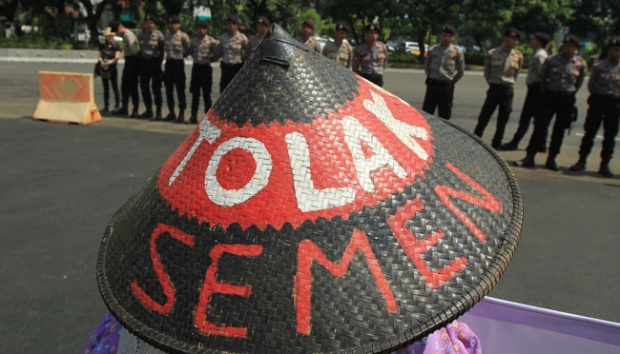
TEMPO.CO, Jakarta - The farmers of Rembang have won a glorious victory. The Supreme Court granted their appeal against the environmental permit issued by the governor of Central Java for the construction of a factory by Semen Indonesia company. This ruling, passed two weeks ago, is an important lesson for officials to be cautious when announcing decisions.
The judges hearing the appeal should be congratulated because they carefully studied the lawsuit filed by the Rembang farmers and Indonesian environmental group Walhi. The judges accepted the new evidence and corrected previous rulings issued by the Semarang State Administrative Court in 2015 and the Surabaya Higher State Administrative Court in November 2015.
The plaintiffs managed to prove that their challenge of the environmental permit issued by the Central Java governor in 2012 was not filed after the time limit. This was the reason why it was rejected by the two other courts. The lawsuit filed by the people of Rembang two years after the governor's decision was seen to be not in accordance with the State Administration Law.
This law does state that lawsuits must be filed within 90 days of the publication of an official's decision. But this condition was relaxed by Supreme Court Circular No. 2/1999, which states that lawsuits can be filed after this deadline if the plaintiffs have only just learned about an official's ruling, or have just realized that they will be harmed by it. This principle, often applied by State Administrative Court judges, should also be applied to the lawsuit filed by the people of Rembang.
The errors made by the judges in Surabaya and Semarang have become even more apparent because it turns out that a witness lied. This witness testified that a Rembang resident named Joko Prianto was present at an event in 2013 to provide information about the governor's decision. In the appeal hearing, it was proven by the existence of a Garuda ticket that Joko was not present, because at that time he was on a flight from Pontianak to Jakarta.
The people of Rembang have opposed the plan to build a cement factory because there was a lack of information released about the environmental impact. In a study of this impact, Semen Indonesia did not carry out an in-depth analysis of the impact of the cement plant on the sustainability of underground springs that flow year round through pores in the limestone karst of the Kendeng Mountains. This karst is hundreds of years old, riddled with caves and springs.
An investigation by a team from Tempo magazine in September 2015 also found irregularities. In the Semen Indonesia environmental impact study, it is mentioned that the kart is of low quality, therefore the nearby land can be cultivated. Seemingly, Semen Indonesia failed to consider the fact that the area is part of the Watuputih groundwater basin, which is protected by Presidential Decision No. 26/2011. If this region is mined, people living in Rembang will find it difficult to obtain water during the dry season. The loss of water catchment areas on high ground also triggers floods and landslides during the wet season.
The Supreme Court corrected the rather arbitrary earlier rulings. This case is an important lesson for regional governments. Although it is necessary to develop regional economies by cutting through the complicated process of issuing permits, officials must be careful when making decisions that have an impact on the environment and on people's livelihoods. Environmental protection must not be sacrificed merely to achieve arbitrary economic growth. (*)
Read the full story in this week's edition of Tempo English Magazine























